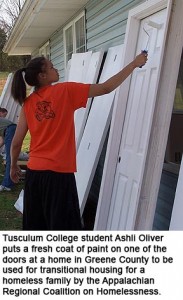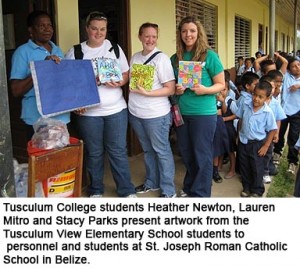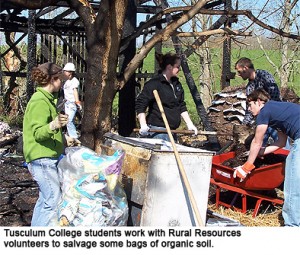Tusculum College students could recently be found serving The Ronald McDonald House, Greene County Habitat for Humanity, the Appalachian Coalition on Homelessness, Plaza Towers senior citizens apartments, Rural Resources in East Tennessee and at St. Joseph Roman Catholic School and the village of Cotton Tree in Belize.
Service-learning and responsible citizenship are emphasized in both the Residential College and Graduate and Professional Studies programs. Following are some examples of this recent service:
GPS students at Ronald McDonald House
 A group of students from Tusculum College Knoxville Regional Center recently spent the day helping the Ronald McDonald House of Knoxville save money and the environment.
A group of students from Tusculum College Knoxville Regional Center recently spent the day helping the Ronald McDonald House of Knoxville save money and the environment.
Four students took a class project to the next level when asked to develop a business plan for a class they were taking. “Rather than just make up a business for the class assignment, we decided to develop a real business plan for a real organization that might not otherwise have the resources to do the research, and which could actually be implemented,” said Debbie McCoy, one of the Tusculum College students.
The team contacted the Ronald McDonald House of Knoxville with the idea of going green and in particular, with an energy-savings, cost-savings project of replacing inefficient incandescent light bulbs with compact fluorescent lamps.
Sue Beverly, Director of the Knoxville Ronald McDonald House was delighted with the idea of saving money and opened the house for the team to conduct an inventory. She provided the utility bills from the last year for the calculations to be made for the part of their utility bill attributable to lighting. All of the team members worked on the project and utilized several types of software and various spreadsheets to work out the numbers. Others members include Mike Henderson, Alton Reeves and Mark Scansen. The calculations, based on attributing 15 percent of the electric utility bills to lighting, showed that an average of $500/month could be saved with the change in lighting.
A sponsor was needed for the cost of the replacement bulbs. After several inquiries, the group located a sponsor – GE Lighting General Distributor, who agreed to provide the new, energy-efficient light bulbs – all 750 of them. The group of students then set a time on a Saturday and gathered to install the new light bulbs.
Class makes community its classroom
 A Tusculum College class recently learned about poverty in the local area and the importance of helping others through their experiences in community service in Greene County. Projects for ARCH (the Appalachian Regional Coalition on Homelessness), Greene County Habitat for Humanity and Plaza Towers have served as the classroom for the students in the “Service-Learning in East Tennessee” course, which had for its focus, “Greeneville Now – and a Vision for the Future.”
A Tusculum College class recently learned about poverty in the local area and the importance of helping others through their experiences in community service in Greene County. Projects for ARCH (the Appalachian Regional Coalition on Homelessness), Greene County Habitat for Humanity and Plaza Towers have served as the classroom for the students in the “Service-Learning in East Tennessee” course, which had for its focus, “Greeneville Now – and a Vision for the Future.”
“This class has allowed us to learn from each other, gain a greater understanding of the affects of poverty and different aspects of community service,” said Glenn Vicary, one of the students in the class. “I think it has affected everyone in a positive way.”
The students’ service in the community began with helping prepare a Greene County Habitat for Humanity home for occupation. Students did minor repairs and painting in the home as well as landscaping around the home. Some students also helped inside the Habitat for Humanity ReStore, sorting donated clothes and helping with storage of donated items.
Painting, sanding, caulking and even the installation of bathroom fixtures were among the many tasks completed by the students who helped rehab a house on Snapps Ferry Road, which will be used as a transitional home by ARCH. The students also helped landscape around the home, which had been donated to ARCH by Habitat for Humanity. The house had been gutted by a Tusculum College service-learning class late last fall.
Helping senior citizens and having a positive impact on the environment was the focus of the students’ next project. The students distributed and helped install compact light bulbs to residents of Plaza Towers. The light bulbs were donated by the Wal-Mart Distribution Center in Mosheim.
Calvin Britt said he had also not thought that much about community service prior to the class, but he learned its importance. “When you see the impact of your efforts on someone’s face, it makes you want to do more.”
The Belize connection
 Tusculum College students visited Tusculum View Elementary School a few weeks ago to share experiences of their recent service learning trip to the country of Belize. It was their second visit to the school, the group met with the elementary students prior to the trip to collect items to take with them.
Tusculum College students visited Tusculum View Elementary School a few weeks ago to share experiences of their recent service learning trip to the country of Belize. It was their second visit to the school, the group met with the elementary students prior to the trip to collect items to take with them.
Tusculum View students collected school and art supplies to be delivered by the Tusculum College students as well and prepared art work to describe their life in the United States to be exchanged with the Belizean students.
The college students delivered art work from the Belize students to Tusculum View and also shared with them many of the cultural differences they found in this Central American country from what they might find living in the United States and talked about the service projects they worked on while on their trip.
Working with ProBelize, part of the international ProWorld service organization, the Tusculum College students volunteered at St. Joseph Roman Catholic School, where they taught students about malaria and its prevention as well as delivered the artwork from the Tusculum View students.
Malaria prevention was also the focus of another service effort of the students while they were in Belize, a trash collection day. On one of the first days of the trip, the students went out into the village of Cotton Tree and distributed trash bags, announcing the trash collection would be two days later. The trash collection was important because the villagers do not have a way to dispose of items such as plastics that cannot be burned. The villagers had been dumping trash into a creek, blocking it which provided a breeding ground for mosquitoes that in turn has resulted in an increase in malaria.
The Tusculum College students also participated in a health check clinic in a marketplace and educated citizens about diabetes and how to prevent and treat it, talked to local citizens about prevention of malaria and other mosquito-borne illnesses as well as participated in a trash collection day.
“I would tell other students that if they have the opportunity to take this class, to do it. It will impact you in a way you have not been impacted before,” said Megan Hart, one of the students in the class.
Other service activities
 A current Service-Learning class had the opportunity to step in almost at a moment’s notice last week to help an organization that needed some emergency assistance. Rural Resources, a non-profit organization that helps promote agriculture through education, economic initiatives and preservation of heritage, lost its office/outdoor classroom building to a fire on Good Friday.
A current Service-Learning class had the opportunity to step in almost at a moment’s notice last week to help an organization that needed some emergency assistance. Rural Resources, a non-profit organization that helps promote agriculture through education, economic initiatives and preservation of heritage, lost its office/outdoor classroom building to a fire on Good Friday.
The students in the class answered the call for help in removing the debris from the remainders of the building, a majority of which was destroyed or heavily damaged in the fire caused by a lightning strike during a thunderstorm. The students also worked to salvage such things as furniture, documents, and photos not claimed by the fire.
The class’ primary focus is also related to Rural Resources, and a grant it has received from the U.S. Department of Agriculture. As part of the grant, Rural Resources is surveying various groups about their access to fresh produce and meats. Tusculum students are helping to administer the survey to low income and needy populations.
Tusculum College students also recently raised more than $1,700 in a Relay for Life event. The “Pioneering for a Cure” effort began as an initiative by resident assistants and grew to include more than 30 students working to raise funds. The students hosted a traveling bake sale on campus and worked roadblocks to collect donations for the event, which raises funds for cancer research. Students also distributed tickets for a fundraiser at the local Zaxby’s restaurant which donated 20 percent of the food purchases made by those showing a ticket when they ordered.


